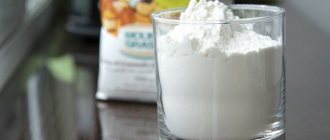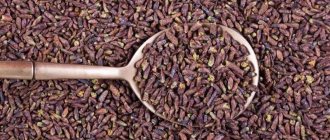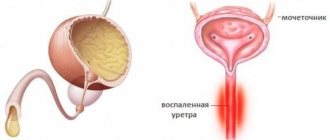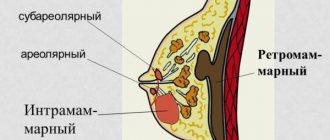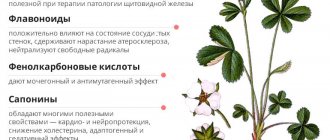Pyelonephritis - what is it?
The diagnosis of “pyelonephritis” implies the presence of an infectious-inflammatory process in the interstitial tissue, which makes up the fibrous basis of the kidney, as well as in the pelvis and tubules, but without damage to the renal vessels and glomeruli.
In this regard, at the initial stages of the disease, the main function of the kidneys (urine filtration) is not affected, but with a long course or improper treatment, inflammation can also affect the vessels with the glomerular apparatus.
Pyelonephritis occurs in acute or chronic form. Most often one kidney is affected, but bilateral inflammatory processes also occur.
The high incidence of the disease among representatives of the fair sex is associated with the structural features of the urinary system in women:
- The urethra is shorter than the male one;
- The urethra in women is located next to additional sources of infection - the anus and vagina, so germs penetrate the urethra faster and more easily.
Treatment of acute and chronic pyelonephritis with folk remedies
Alternative treatment is highly effective in eliminating the symptoms and causes of acute and chronic pyelonephritis. In addition to antibiotics and other pharmaceutical drugs, doctors prescribe herbal remedies. Therefore, even doctors recommend combining herbal medicine and pharmaceutical drugs. In this case, treatment can be successfully carried out at home. However, we are talking exclusively about the uncomplicated form of the disease.
We recommend reading: Signs of cholecystitis and treatment at home
It is necessary to discuss the use of folk remedies with your doctor. This will make it possible to check the drugs for tolerability, as well as to avoid conflicts between drugs when combining traditional treatment and herbal medicine. In the acute form of the disease, bed rest, drinking plenty of fluids, following a diet and taking anti-inflammatory drugs are important. Herbal medicine should be aimed at relieving the inflammatory process, as well as increasing immunity.
In the chronic form of the disease, home treatment is aimed at preventing exacerbation, improving kidney function, and normalizing urination. When treating chronic pyelonephritis, doctors recommend making preparations so that at the first stage they contain more bactericidal herbs, and at the second - diuretics. Therefore, to treat different forms of the disease, various herbs and other folk remedies are most often required.
Causes of pyelonephritis
In women, due to the above anatomical features, the ascending (urinogenic) route of infection into the pelvis and kidney tissue comes first - due to cystitis, urethritis, colpitis, colitis, urolithiasis and abnormalities in the structure of the urinary system, long-term placement of a catheter for excretion of urine.
Hematogenous (through the bloodstream) spread of infection is also possible, when any focus can become a potential source - previous purulent mastitis, sore throat, panaritium, inflammation of the ear and even inflammation of the dental canal (pulpitis).
The main microbe that causes pyelonephritis is Escherichia coli (up to 75% of all cases).
The remaining 25% of cases are associated with the entry into the urinary tract of Klebsiella, Proteus, Staphylococcus aureus, Enterococcus, Pseudomonas aeruginosa, fungal infection, chlamydia, salmonella, etc.
Risk factors for the occurrence of pyelonephritis in women are all protracted pathological processes of any localization that occur with a decrease in the overall immunity of the body: diabetes mellitus, bone marrow diseases, neurological problems (multiple sclerosis), HIV infection, conditions after chemotherapy or organ transplantation.
In addition, pregnancy can aggravate the chronic form of the disease and trigger an acute inflammatory process due to compression of the bladder and ureters by the growing uterus.
Signs and symptoms of pyelonephritis in women
Chronic inflammation often occurs smoothly and symptoms of pyelonephritis in women are practically absent or manifested by vague nonspecific complaints of aching pain in the lower back after hypothermia, increased fatigue and slight general malaise.
Signs of acute pyelonephritis in women are usually more pronounced:
- Severe pain in the back or side, most often from inflammation, but there may also be diffuse pain under the ribs, in the lower abdomen, or without clear localization;
- High temperature (38-40°C);
- Nausea and vomiting;
- Changes in urine (darkening, blood or pus, unpleasant odor);
- Painful sensations when urinating;
- The appearance of swelling of the face and fingers;
- Marked weakness.
Diagnosis of pyelonephritis
To establish a diagnosis, a number of standard examinations are needed:
- Examination by a urologist or nephrologist with palpation of the abdomen and determination of Pasternatsky’s symptom (tapping on the back in the projection of the kidneys).
- Gynecological examination to exclude problems in the female genital area.
- Urine tests: general, according to Nechiporenko, according to Zimnitsky, urine culture with determination of flora and sensitivity to antibiotics.
- Blood tests: general, biochemical (determination of creatinine, urea, protein).
- Ultrasound of the kidneys.
- In complex and severe cases, they resort to CT, MRI, excretory urography, radioisotope scanning and other methods.
Treatment of pyelonephritis in women, drugs
Treatment should be aimed at restoring normal urine flow (removing stones, eliminating vesicoureteral reflux) and eliminating the source of infection - for pyelonephritis in women, antibiotics, chemical antibacterial agents and uroseptics are prescribed.
The acute form of the disease requires hospitalization and bed rest; in the chronic form, outpatient treatment is possible. A diet high in light carbohydrates, fermented milk products, and plenty of drinking is prescribed.
The treatment period for acute pyelonephritis is 10-14 days, for chronic pyelonephritis - from 6-8 weeks to 1 year. To consolidate the effect at the recovery stage, it is recommended to increase the body’s immune reactivity (immunomodulators, hardening).
Medicines for the treatment of pyelonephritis:
- Antibiotics - ciprofloxacin, cefuroxime, gentamicin, cefepime, meronem.
- Chemical antibacterial agents - furagin, nitroxoline, gramurin, nevigramon, palin, bactrim.
Medicines should be prescribed by a doctor, taking into account the form of the disease and the individual sensitivity of the flora isolated from urine. To prevent the infection from developing resistance to antibacterial agents, they need to be changed every 5-7 days.
The effectiveness of folk remedies
How effective is treatment for pyelonephritis at home and is it worth the time? When starting therapy with folk remedies, you should understand that the result will only come with long-term and persistent use of the recommended herbs and products. One-time procedures will not give any effect.
In addition, it is necessary to remember about contraindications. The use of folk remedies for the treatment of pyelonephritis may not be suitable for patients with heart pathologies and pregnant women. In other cases, herbal medicine will show excellent results, comparable to the use of medications.
Treatment of pyelonephritis with folk remedies should be approached very responsibly, in no case replacing prescribed medications with them. By properly combining alternative and classical medicine, you can get rid of the disease forever. If there are no exacerbations within 5 years, then the disease is far behind.
Author: Elena Medvedeva, doctor, especially for Nefrologiya.pro
Prevention of pyelonephritis
To prevent the development of the disease, it is necessary not to overcool, promptly treat all inflammatory processes (from ARVI or caries to panaritium or vulvovaginitis), ensure normal bladder emptying, maintain intimate hygiene, practice safe sex, eat right and monitor the quality and quantity of fluid consumed ( purified water, teas, juices - up to 1.5-2 l/day; carbonated sweet drinks should be excluded).
But correct diagnosis and timely initiation of treatment are crucial in the prevention of any disease of the genitourinary system, therefore, if the suspicious symptoms of pyelonephritis described above appear, you should consult a doctor.
Pyelonephritis - symptoms, treatment with folk remedies.
This is inflammation of the kidney tissue. A person of any age can get pyelonephritis, but they are most often affected by:
Children under 7 years of age who have a disease associated with anatomical developmental features.
Women and girls aged 18-30 years, the appearance of nephritis in whom is associated with the anatomical features of the structure of the urinary tract, childbirth, pregnancy.
Elderly men suffering from prostate adenoma. One of the most common prerequisites for the development of pyelonephritis are attacks of renal colic and urolithiasis.
In these conditions and diseases, the outflow of urine from the kidney is disrupted, which gives microorganisms the opportunity to multiply in it. Diabetes mellitus, decreased general immunity, hypothermia, chronic inflammatory diseases, and other unfavorable factors also contribute to the occurrence of the disease. Pyelonephritis develops when pathogenic microbes invade the kidney tissue. Microbes spread through the ureters from the bladder during cystitis, urethritis. Microbes can enter through blood vessels with the blood flow from internal foci of inflammation, from the nasopharynx, for example (tonsillitis, sinusitis, rhinitis, tonsillitis), the oral cavity (dental caries), (folk remedies for cystitis).
It is not inherited, but the prerequisites for its appearance can be inherited: a predisposition to kidney stones, structural features of the urinary tract. If you have unfavorable heredity, you need to take care of your kidneys, try not to overcool them, and treat nasopharyngeal infections in time (how to treat sinusitis).
Pyelonephritis - symptoms
Pyelonephritis can occur in acute or chronic forms. Symptoms of acute pyelonephritis appear suddenly. Symptoms of acute pyelonephritis: a sharp increase in temperature to 39-40 degrees, the appearance of profuse sweating, headache, weakness; Possible vomiting and nausea. With fever, a symptom of pyelonephritis such as lower back pain appears simultaneously, on one side, usually. The intensity of the pain can vary, but mostly it is dull. If the cause is urolithiasis, then the development of the disease is preceded by an attack of renal colic. Usually the urine does not change visually, but may sometimes be cloudy.
When contacting a specialist, urine and blood tests and studies are performed to show the general condition of the urinary tract (X-rays, ultrasound of the kidneys). If left untreated, the disease becomes chronic or suppurative processes may develop (carbuncle, kidney abscess, among others). Suppurative processes manifest themselves as sudden changes in temperature (35-36 degrees in the morning to 40-41 degrees in the evening), deterioration of the patient’s condition.
Patients with acute pyelonephritis must be hospitalized. Detoxification, immunostimulating, antibacterial therapy is carried out for uncomplicated forms of the disease. Pyelonephritis is treated until microbes are completely eliminated from the patient’s urine and tests are normalized. The course is usually 2-3 weeks. The operation is indicated for suppurative complications. Also, sometimes it is necessary to resort to surgical intervention in case of urolithiasis, if the stone does not pass out on its own.
Typically, chronic pyelonephritis is a consequence of undertreated acute, unsuccessful complete destruction of all microbes in the kidney, restoration of normal urine outflow. A chronic inflammatory process rarely develops with virtually no symptoms of pyelonephritis; changes in the kidneys can only be diagnosed in urine tests based on deviations from the norm.
Symptoms of chronic pyelonephritis - lumbar dull aching pain, in cold damp weather - are especially noticeable. The pain can be periodic or constant. Patients are sometimes bothered by the urge to urinate at night. It is treated in the same way as acute, but more labor-intensive and time-consuming. To cope with the disease, first of all, it is necessary to establish the causes of disturbances in urodynamics (outflow of urine from the kidney), and determine the type of pathogen responsible for the occurrence.
Recipes for herbal preparations and mixtures
The choice of medicinal herb or collection depends on the form of the disease, as well as the individual characteristics of the body. For the treatment of chronic pyelonephritis, herbal medicine is recommended, which is aimed at relieving inflammation and improving urinary function.
St. John's wort, bearberry and knotweed
It is necessary to take herbs in equal proportions. Pour a tablespoon of the mixture into 250 ml of hot water and leave for an hour. Divide a glass of infusion into two doses and drink warm.
It is recommended to use this product for two weeks. It improves kidney function and relieves inflammation.
Horsetail, St. John's wort, mint and wild rosemary
Mix St. John's wort, mint, wild rosemary and horsetail in a ratio of 1:2:2:4. Pour two tablespoons of the resulting mixture into a liter of hot water and leave for several hours. It is better to leave the infusion in a thermos overnight and drink it in small portions throughout the next day.
Blackcurrant and birch leaves, rose hips and hop cones
This collection not only improves kidney function and normalizes urinary function, but is also a tasty and aromatic alternative to tea. To prepare it, you will need to take a teaspoon of each herb, add a few rose hips and pour 400 ml of hot water. This infusion is effective to take in the morning on an empty stomach and before bed.
Gastroduodenitis is a very unpleasant disease; its treatment, especially with folk remedies, must be approached very carefully.
Are you suffering from constipation? Use traditional medicine. Read more here.
Diuretics are also used for weight loss. Basic recipes are in this article.
For acute pyelonephritis, it is recommended to use preparations that relieve inflammation and increase the body's protective functions.
We recommend reading: Causes and treatment of urolithiasis in men and women
Horsetail, licorice root and juniper berries
Take a tablespoon each of dried licorice root and horsetail, as well as a few juniper berries. Pour in 700 ml of water and boil for 10 minutes. Strain and take 30 ml several times a day. This remedy relieves inflammation in just a few days. However, a course of treatment of at least a month is required to prevent the disease from becoming chronic.
Birch buds, bearberry, chamomile and horsetail
Take herbs in equal quantities. Pour 500 ml of vodka or alcohol into a glass of the prepared mixture. Leave for 10 days, then strain. Take the finished infusion one teaspoon before meals or add 20 drops to tea, water, juice and other drinks.
Causes of pyelonephritis
The main culprit of the disease is infection. Often, this is Escherichia coli, but there may also be other pathogenic microorganisms - Proteus, streptococci, gram-negative pseudomonas - Pseudomonas aeruginosa, enterococci.
Infectious agents are able to penetrate the renal system through urine, when there is a reverse reflux, with the blood flow in a descending way, if there are chronic foci of infection in the body.
Various factors also influence the development of pathology:
- disruption of urine outflow due to obstruction of the genitourinary canals;
- congenital malformations of the pelvic organs;
- weakened immune system;
- nervous system disorders, frequent stress;
- physical overload of the body and hypothermia;
- injuries of the spinal column, spinal cord.
In older women, the anomaly is associated with age-related changes and increased levels of harmful substances in the body, a large amount of pathogenic intestinal flora. Pregnancy, dysfunction, and displacement of the uterus away from the vagina play an ambiguous role in inflammation of the organ.
Causes
There are many different reasons why women develop pyelonephritis. By the way, with age the risk of this pathology increases.
Urologists are convinced that pyelonephritis occurs in women with the simultaneous presence of several factors.
If an infectious agent is present in the body, the immune system is weakened, and there is also a factor that provokes pathology, then it is unlikely to avoid kidney inflammation.
Other diseases to which a woman is susceptible can also provoke this pathology.
In particular, urolithiasis provokes stagnation, as a result of which the number of pathogens increases, and accordingly, inflammation occurs against this background.
Inflammation of any organs entails an inflammatory process in the kidneys. It is very important to carry out immediate treatment when inflammatory or infectious diseases are detected in order to prevent serious and dangerous consequences.
If a woman was prescribed bladder catheterization during treatment, the likelihood of pyelonephritis is also high.
It is for this reason that urologists most often try to abandon the use of a catheter in order to avoid the risk of inflammatory processes.
Pyelonephritis can also be provoked by women themselves who strive to follow fashion without paying attention to their health status.
The kidneys are afraid of any hypothermia, so it is very important to observe the thermal regime. In winter, it is necessary to wear clothes that provide good warmth to all parts of the body, including the lumbar region.
If the kidneys are already weakened, urologists recommend doubly worrying about warming the lumbar region, recommending wearing special woolen belts.
Also, pyelonephritis in women can occur when recommendations regarding drinking regime are ignored. A sufficient amount of water entering the body helps cleanse the kidneys and flush out infections.
Symptoms of pyelonephritis in women
The disease occurs in chronic or acute form. In the first case, there are almost no signs, only a general broken state, pain in the lumbar region, rapid onset of fatigue, and weakness are observed.
During the acute course, the following characteristic manifestations of the disease are observed:
- body temperature rising to high values (39-40 degrees);
- pain and discomfort when emptying the bladder;
- severe pain in the spine, at the site of the inflammatory process, in the side, abdomen, in the area of the ribs;
- typical signs of poisoning are attacks of nausea ending with vomiting;
- swelling of the upper and lower extremities, mainly fingers, swelling of the face;
- muscle weakness, inability to perform active actions.
At the same time, the urine becomes dark in color, pus and blood can be traced in it, and an unpleasant odor appears.
With chronic pyelonephritis, only one or two main symptoms are clearly manifested - pain, urination disorder or high blood pressure.
Pain in the kidney area occurs due to the fact that during illness they stretch and increase in volume. It is especially strong during exacerbations of pathology.
Diagnostic tests for pyelonephritis
The first visit to the doctor begins with an analysis of the patient’s complaints, collection of anamnesis data, and an examination by a urologist, including palpation of the back and abdomen. The woman will also have to undergo an examination by a gynecologist to rule out gynecological causes of the phenomenon.
Along with this, other research is required:
- laboratory blood tests (clinical, general level of uric acid, creatinine);
- general urine analysis;
- bacteriological culture to identify infectious agents;
- Ultrasound examination of the kidneys to determine their size, structure and condition.
To clarify the diagnosis, excretory urography (x-ray scanning of the urinary tract using contrast agents), scintigraphy (testing using radioisotopes), computed tomography, and magnetic resonance imaging may be prescribed. In order for diagnostic data to be reliable, tests are carried out three times over 30 days.
If pyelonephritis is diagnosed, symptoms and treatment in women are interrelated - the overall result of recovery depends on this.
Pyelonephritis: symptoms and treatment in women
When diagnosed with pyelonephritis, the doctor considers several treatment methods:
- conservative therapy with medications;
- special diet;
- physiotherapeutic procedures;
- treatment of pyelonephritis with folk remedies;
- resort and sanatorium therapy.
Medicines usually include:
- antibiotics of the broad-spectrum cephalosporin class - Cefomax, Cenopharm, Cephelim (in the form of injections);
- antibacterial chemotherapy drugs – Sparfloxacin, Moxifloxacin;
- aminoglycoside aminocyclitols – Sizomycin, Tobramycin (used for purulent inflammatory process);
- beta-lactams – Meropenem, Invasin.
During pregnancy, Furagin, Ampicillin, Thienam are used, depending on the type of pathogen and the patient's condition. If the disease is severe, a combination of a group of cephalosporins with aminoglycosides is recommended.
A prerequisite for the use of antibiotics is their combination with antiallergic drugs and autohemotherapy to increase the body's defenses through transfusion of one's own blood.
Also during the treatment process, diuretics are used to restore normal urination, remove metabolites and toxins from the body due to the bactericidal effect of antibiotics. Multivitamin complexes, antioxidants, and painkillers are prescribed to relieve pain. In order to improve the functioning of the immune system, Methyluracil and Gamma globulin are prescribed. A special place in treatment is occupied by diet for pyelonephritis.
Traditional treatment of kidney pyelonephritis
Alternative medicine does not replace official medicine, but in some situations its methods are accepted by doctors as auxiliary. How is kidney pyelonephritis treated with folk remedies?
Indications for use
Medicines based on medicinal plants are considered folk medicines. Their collection and processing require certain skills. Former grandmother's remedies have become pharmacopoeial, occupying the shelves of pharmacies under the name of herbal remedies.
Some of them are produced in the form of capsules, extracts, or pills. Others are intended for the preparation of infusions and decoctions, the recipe for which is in the attached instructions. Folk remedies are prescribed by urologists for chronic pyelonephritis, when the use of potent medications is not indicated.
Classification
Like other medicines, herbal medicines according to their pharmacological action are divided into the following groups:
- Antimicrobial.
- Antiphlogistic.
- Detoxification.
- Biostimulants.
Antimicrobials
Among the herbal medicines used in the treatment of pyelonephritis and having bactericidal properties, the following are distinguished:
- Brusniver.
- St. John's wort.
- Bearberry.
Herbs for pyelonephritis
Brusniver
The composition of the herbal medicine intended for making the infusion includes the following components:
- Lingonberry leaves.
- Rosehip fruits.
- Herb string and St. John's wort.
St. John's wort
The herbal medicine is produced in herbal cuttings, powder, filter bags, and tablets. Medicines are made from the plant in the form of an extract. The folk remedy is universal and is indicated for use in many diseases.
Bearberry
The leaf preparation is produced in crushed form or in filter bags. Decoctions and infusions are prepared from them, or consumed in the form of tea.
Anti-inflammatory drugs
Traditional treatment of kidney pyelonephritis involves the use of the following herbal remedies that have antiphlogistic properties:
- Phytolysin.
- Canephron.
Phytolysin
It is an extract of medicinal herbs prepared in the form of a paste. It has antiphlogistic, antispasmodic, diuretic effects. Prevents the formation of stones. In addition to the treatment of pyelonephritis, the drug is used for urolithiasis, as well as inflammation of the bladder.
Canephron
The product is a collection of medicinal herbs produced in solution or dragee. Effectively relieves pain symptoms. Used to prevent exacerbations of pyelonephritis and cystitis.
Detoxification products
The main detoxification technique is the accelerated elimination of toxic metabolites in the urine. Therefore, use the following decoctions or infusions of herbs, or mixtures thereof:
- Chamomile.
- Fennel.
- Calendula.
- Knotweed.
- Peppermint.
Herbs for pyelonephritis
Biostimulants
Folk remedies for kidney pyelonephritis include the following plants that have the properties of stimulating the body's defense systems. Decoctions, infusions, juices, as well as fresh fruits of the following plants are shown:
- Eleutherococcus.
- Ginseng.
- Schisandra.
- Cranberries.
- Sea buckthorn.
Side effects and contraindications
Drugs that have a medicinal effect can cause harm if used incorrectly. Before taking them, you must study the instructions, which report the following undesirable effects:
- Regurgitation.
- Diarrhea.
- Hives.
- Nausea, vomiting.
- Exacerbation of the disease.
Some herbal remedies have contraindications for use under the following circumstances:
- Intolerance to the components of the drug.
- Breast-feeding.
- Pregnancy.
- Age restrictions.
Conclusion
Folk remedies are auxiliary drugs in the treatment of chronic pyelonephritis under the supervision of a urologist. You should not take risks by using them yourself. Many drugs, especially the most effective ones, have contraindications.
Related posts:
Herbs for pyelonephritis
Diet for kidney pyelonephritis


